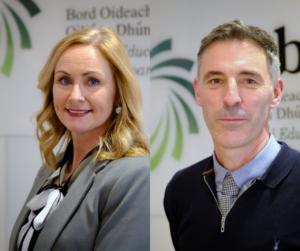
Following Russia’s invasion of Ukraine in 2022, thousands of Ukrainians sought safety in Ireland. In response, the Department of Education set up Regional Education and Language Teams (REALTs) around the country, hosted by Education and Training Boards. But what exactly is a REALT and what does it do? In this blog our REALT Coordinators Rosaleen Harkin and Lochlainn McCool tell us more about it.
As a response to the humanitarian crisis that developed with the invasion of Ukraine, the Irish government made a commitment to welcome people fleeing the war and seeking protection in Ireland. From the outset of the war in early March 2022 the numbers of people arriving In Ireland from Ukraine were significant, and it was clear that support needed to be put in place in order to make the process of enrolling children in schools as seamless as possible for families and schools.
The Department of Education put in place a system of Regional Education and Language Teams (REALT), hosted by the sixteen regional Education and Training Boards (ETBs), to support the education needs of children from Ukraine arriving in Ireland. The core function of the REALT is to help families to find a school place. This work involves working with the families, Schools, Bus Éireann, National Council for Special Education (NCSE), Tusla, the Donegal Integration Team/Community Response Forum and local community organisations, in order to locate school places, assist with enrolment and school transport and to provide relevant information, supports and signposting.
As at 09 June, there were 1,564 Ukrainian children enrolled in schools in Donegal. The swift response and welcome from our school communities is to be commended and should not be underestimated for its importance in bringing some normality to the lives of these families and children.
The REALT team is usually the first educational point of contact that Ukrainian families have and we contact schools on their behalf. We have experienced a very positive response from the schools in the county. School staff, students and the wider community have responded in a welcoming and inclusive manner, showing empathy and understanding. Many schools have benefited from the increased enrolment – gaining additional teaching staff and resources, and in some cases securing new bus routes due to the increased numbers.
Equally, Ukrainian families are grateful for the support they receive in navigating their new environment:
“Thank you very much for your assistance, help in finding a school for my children! Once again I am convinced that the world is not without good people, I want to express special gratitude on behalf of all the Ukrainian families whom you helped. Huge gratitude from the children, they are delighted with the new school!”
While we hear many positive stories, there are also challenges for schools due to the language barrier and at times working with children that have suffered trauma or who may have additional educational needs. REALT is often the first point of contact for schools that are experiencing challenges so we deal with queries from schools on a daily basis. Our relationships and information sharing with the Department of Education and other partnership organisations enables us to give guidance to schools and to families, advising of support available, and/or signposting to the relevant services. For example, we provide information in relating to additional teaching hours and resources that are available to schools, assist schools access supports offered by the local partnership organisations such as Donegal Local Development Company (DLDC) and Inishowen Development Partnership, we report schools’ challenges and concerns to the Department of Education, and we offer guidance in relation to general queries.
We also work closely with Bus Éireann in relation to providing transport for the children, this can be challenging as many children have to travel to schools outside of the catchment area due to lack of capacity in their local schools. In recent months we have had the challenge of many families being relocated to different accommodation. Where feasible, we work with schools and Bus Éireann to try to accommodate the children being able to remain in their current school, but this is not always possible. Bus Éireann are to be commended for their cooperation and their commitment in being able to provide transport for over 1,200 additional students.
The REALT role continues to evolve as the children progress through school and the types of support needed by families and by schools changes accordingly. In recent months we have seen the numbers of Ukrainians coming into the country decrease while the number of International Protection Applicants has increased and this has had a knock-on effect on our role. Working in collaboration with the Tusla Education Welfare Officer, the majority of our recent enrolments have been International Protection children.
The successful outcomes for both Ukrainian and International Protection children will be greatly affected by their experience in our schools and communities in Donegal and, in cooperation with the schools and the local integration team, we will endeavor to make it as positive as possible in the years ahead.
Further information about REALTs is available here with contact details for REALTS around the country here.
